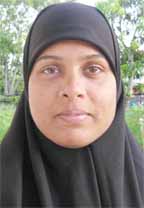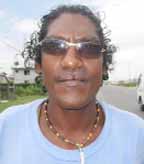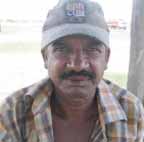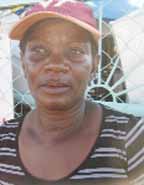Interviews and photos by Shabna Ullah
This week on What the People Say we asked Berbicians to comment on issues that are affecting them and got the following responses:
 Fazeela Bacchus, seamstress
Fazeela Bacchus, seamstress
`I am concerned that we have a lot of school dropouts in Berbice. Parents may have a lot of children to take care of and they cannot afford to send them to school. In many cases when the children reach a certain class they would stop going to school. Then the girls would get married at a young age. They would start having children early and would not be able to take care of them. When they face the pressure they would regret it but it may be too late for them to get out. Right now I know of two girls who recently turned 15 and are preparing to get married.’
 Ganeshwar Etwaru, village courier,
Ganeshwar Etwaru, village courier,
`So far the country is going good except that the development is slow. I trust in God that for this year things would be better than last year. We need more jobs to be created especially for the youths. I wish if more factories can be opened in Berbice so persons can have more jobs. I believe that if every person has a job more taxes would be paid and the country would be able to develop better. Persons would not have the cause to steal or beg for a living.’
 Panzie David, poultry rearer/CBR volunteer
Panzie David, poultry rearer/CBR volunteer
`I am totally against domestic violence; I do not believe any man should hit a woman. I offer counseling to the victims and their abusive partners. Some of them think that they would no longer be accepted in society. The men make the women feel guilty as though it is their fault that they are being abused. The women are so weak that even if the police lock up the men they would feel sorry for them and get them released. When the matter reaches the court the women would go and beg the magistrates to give the men a chance. But then the same thing would happen and even the police would not want to bother with them anymore. I think that the perpetrators of domestic violence also need assistance; many times after talking to them I get them to stop abusing their partners. I am also disappointed in the behaviour of some schoolchildren. They do not show respect to the elders.’
 Alim Mohamed, Guysuco labourer
Alim Mohamed, Guysuco labourer
`Right now the cost of living is very high. Prices keep going up in the shops and market although the income is still low. I used to pay $2,900 for a bottle of cooking gas but recently I paid $3,300. Things are getting very hard; instead of prices coming down they are going up. I paid $120 each for baby chicks that I rear for my home use but now I have to pay $150 and even the feed has gone up. I also plant a garden but because of the dry weather the produce is not growing. Ten weeks now the crop at Guysuco started back and soon we would have three months out-of-crop again. During that time we would get about four days work per week and if there is a holiday we would lose work for that day. I also plant a kitchen garden but because of the dry weather the produce cannot grow well.’
 Hemchand Khandai, sheep/cash crop farmer
Hemchand Khandai, sheep/cash crop farmer
`The weather is very hard right now and everything that I do for a living depends on the rain. If the rain doesn’t fall the grass wouldn’t grow and the animals would starve. They go to the trench for water but the water is too low. The sheep are not gaining weight and I cannot get good prices for them when I try to sell them. I plant mostly eschallot and celery and my garden depends on the rain. I am also reaping less produce now. My crops are also affected by diseases and the drugs are very expensive. I know this dry weather is God’s work but I am praying for it to end and for the rain to come.’
 Margaret Thomas-Mc Almont, food vendor
Margaret Thomas-Mc Almont, food vendor
`The most disturbing thing for me is that pigs and cows would break my fence and destroy the plants in my yard. When I tell the owners they do not do anything about it. I cannot plant anything in peace but I know that I have to plant. Another concern I have is about domestic violence in Berbice. I think that the police need to be very stern about it. Women are soft and they and they would take back their husbands for their children’s sake but they end up being abused again.’
 Dabie Ramphal, farmer/vendor
Dabie Ramphal, farmer/vendor
`My issue is that …there is a rural constable destroying my crops and livestock. All of this is happening because of a piece of land that I bought. Although I saw him doing it I am not getting any satisfaction from the police. They tell me that I have to get an eyewitness. I went to the high ranking officers to complain and they instructed the lower ranks to charge him but they never institute any charge. It is part of my livelihood that he is destroying. He is spraying them with weedicide and that causes them to dry out from the bottom and the flowers to drop off. I now have to buy everything to sell. He also killed my ducks and threw them for my dog to eat.’
 Celeste Robertson, housewife
Celeste Robertson, housewife
`My concerns are about the youths and the way they carry themselves. They are rude and lawless and when you try to talk to them they abuse you. A lot of them who are of school age would not go to school many days. Some of the parents know about it but they do not take complaints. They tell you to mind your own business. Some of them are liming after school and can get into trouble. The Schools’ Welfare Officers and the police need to do something about it. They should visit the school and talk to them about the importance of going to school and have an education.’
 Zulaika Ishak, retired headmistress
Zulaika Ishak, retired headmistress
`With the El Nino condition on, people are still wasting water. A lot of the Islands are in extreme stress due to the condition. Although we have a lot of water in this country they cannot take it for granted; they need to conserve. Some persons are also throwing garbage in the drains, at the roadside and out of vehicle windows. They need to have plastic bags in their vehicles for garbage and then dispose of it properly. They should be more responsible and conscious of their environment and keep it clean. It is not fair for someone else to clean it up. If they continue to block up the drains, when the rain comes we would have floods again.’
 Arnold Persaud, retired headmaster
Arnold Persaud, retired headmaster
“Why can’t we be like the people in Venezuela? They weed in front of their homes and that is discounted from their tax. Some persons were employed by the government through the drainage and irrigation programme. They started and did a slapdash job; but I don’t see them anymore. They wait until the rain comes and then we would get flood. The D & I is pumping money down the drain and the work is not being done. The public health officer should go around and check and if he finds that persons are not cleaning, he should send them warning letters. About three times I paid $1,500 each time to clean in front of my home. There is an old saying that if everyone sweeps in front of his own door the whole world would be clean. We go to North America and we see no litter. We come back we practice the clean habits for a time and we go back to the old habit. But if we take off ‘h’ in habit and we are still left in ‘abit.’ Take off ‘a’ from ‘abit’ and we are still left with bit, take of ‘b’ from ‘bit’ and we are still left with ‘it.’ So you see my dear Guyanese how difficult it is to break a habit. Too late, too late shall be the cry. Persons should not throw their litter in the drains. Why can’t we put heads and hands together and make this glorious country a place where all would like to come and live?”
